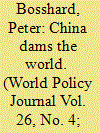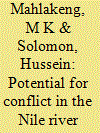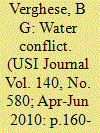|
|
|
Sort Order |
|
|
|
Items / Page
|
|
|
|
|
|
|
| Srl | Item |
| 1 |
ID:
112865


|
|
|
|
|
| Publication |
2012.
|
| Summary/Abstract |
The meaning of Asia has changed drastically during the millennia the concept has been in use. Its usage was established in Greek literature 2,500 years ago as a geographic reference to lands inhabited by the Greeks at the Eastern side of the Aegean Sea. Over the ensuing centuries, Asia's Western boundary was extended to the rivers Don in the North and Nile in the South. At that time, it hardly contained any definite political or civilisational meanings. These were added to the concept in 1730 in a kind of Swedish-Russian cooperation when the Urals were redefined to form the boundary between Europe and Asia, the former starting to represent progress, and the latter its opposite. This situation has been gradually changing after World War II, when first definitions made in the United States, and later in East Asian countries have devalued the position of Europe and elevated that of Asia. Today, Asia is not a geographical concept. It is a political commonplace, used as a strong and positively loaded linguistic asset in political rhetoric in the Asian Pacific area for various kinds of regional integrative purposes.
|
|
|
|
|
|
|
|
|
|
|
|
|
|
|
|
| 2 |
ID:
094257


|
|
|
| 3 |
ID:
145255


|
|
|
|
|
| Summary/Abstract |
Recent studies of Egypt's long-standing dispute with Ethiopia over the distribution of the waters of the Nile River assume that the adoption of the Nile Basin Initiative in 1999 heralded a sharp turn toward regional conciliation and harmony. This assumption is unwarranted, given Cairo's insistence that its “historic rights” to the Nile be preserved and the belligerent response by Egyptian politicians to Ethiopia's inauguration of the Millennium Project in the spring of 2013. A careful survey of recent relations between the two states demonstrates that the dispute retains a high potential for severe conflict.
|
|
|
|
|
|
|
|
|
|
|
|
|
|
|
|
| 4 |
ID:
088929


|
|
|
|
|
| Publication |
2009.
|
| Summary/Abstract |
The La Plata River Basin in South America, whose waters are shared by Argentina, Bolivia, Brazil, Paraguay and Uruguay, provides important lessons from the long history of negotiations over its shared water and other natural resources. In particular, innovative resource management practices developed over time have led to the relative harmony in which the riparian countries coexist. In this article, we analyze negotiation techniques within the La Plata River Basin by examining in detail the processes leading to the two seminal agreements - the 1969 Treaty of La Plata Basin and the 1979 Itaipú-Corpus Agreement. Based upon our analysis of the complex and often contradictory relationships between the riparian states, we evaluate the outcomes of both treaties from the standpoint of cooperation in the region and sustainable development. In doing so, we extend the relevance of the analysis to other basins with similar issues of regional management. The article extends the basin cooperation, through negotiation, to include trade agreements and development via project partnerships that draw in regional and global actors, including non-governmental organizations, environmental lobbies in foreign countries, and multinational development banks. The above actors are relevant for many parts of the world in today's era of globalization.
|
|
|
|
|
|
|
|
|
|
|
|
|
|
|
|
| 5 |
ID:
138042


|
|
|
|
|
| Summary/Abstract |
Since the end of the twentieth century, the realm of international relations has been characterised by resource geopolitics - the potential for conflict as a result of the scarcity of vital resources that cross political boundaries.
|
|
|
|
|
|
|
|
|
|
|
|
|
|
|
|
| 6 |
ID:
098078


|
|
|
| 7 |
ID:
153094


|
|
|
|
|
| Summary/Abstract |
The article aims to explore the securitisation of water in the Nile basin. As in the wider Middle East, the securitisation of water occurred in the context of larger political grievances, inherited from colonial times. The trigger in all cases has been water scarcity. The securitising actors in all cases were decision-makers; in the case of the Tigris–Euphrates basin, NGOs and human rights activists have also emerged as securitising actors. The target audiences in all cases included the national public and international public opinion, as well as decision-makers in donor countries, especially in the case of the Tigris–Euphrates and Nile basins. Several securitisation mechanisms have been used simultaneously in all cases; in the case of the West Bank Aquifer, for example, resource capture (structural securitisation) went hand in hand with joint water management committees (institutional securitisation). In all cases, language played a crucial role in the securitisation of water resources, especially in the cases of Egypt and Israel, where the symbolic value of water and land are closely tied with religious traditions inherited from ancient times.
|
|
|
|
|
|
|
|
|
|
|
|
|
|
|
|
|
|
|
|
|